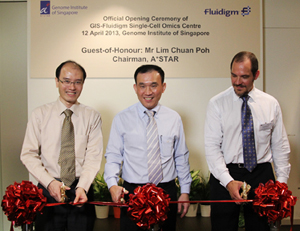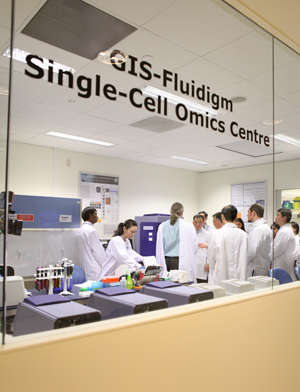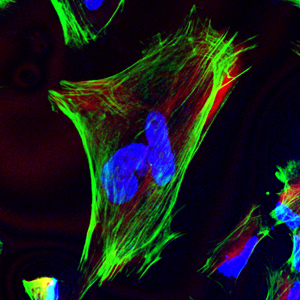
Huck Hui Ng (left), executive director of the A*STAR Genome Institute of Singapore (GIS), Lim Chuan Poh (center), chairman of A*STAR, and Gajus Worthington (right), president and chief executive officer of Fluidigm, at the official opening of the Single-Cell Omics Centre (SCOC).
© 2013 A*STAR Genome Institute of Singapore
Single-cell genomics is one of the most riveting emergent areas in contemporary life sciences research. Understanding how individual cells work could provide valuable insight into some of the fundamental biological mysteries of our time, paving the way for new diagnostics, treatments and methods of prevention for diseases such as cancer and diabetes. Early successes in the field include the elucidation of important single-cell phenomena involved in aging, the loss of sight through macular degeneration and the spread of infectious diseases. Correspondingly, the Single-Cell Omics Centre (SCOC) was established to serve as a key resource for both academia and industry in Singapore and the surrounding region, helping the research community pursue new frontiers in single-cell genomics.
The SCOC is the result of a forward-thinking collaboration between the A*STAR Genome Institute of Singapore (GIS), a prominent center for genomic discovery with the goal of using genomic sciences to improve public health and prosperity globally, and Fluidigm Corporation, an industry leader in single-cell genomic technologies and the first biochip company to be established in Singapore. The center is envisioned as a hub that brings scientists from various fields of biology together to work toward a common objective such as understanding how stem cells might be reprogrammed for therapeutic treatments. Knowledge of the processes involved would be highly beneficial for the development of new drugs and the tailoring of therapies to the needs of individual patients — so-called ‘personalized medicine’.
The SCOC’s official inauguration event — held in April 2013 — attracted government officials, prominent academics and industry leaders. As the first research center in Asia fully dedicated to the study of how individual cells function and behave in disease states, the SCOC aims to become a valuable resource through which researchers in the region can access integrated analytics for single-cell genomic applications. Lim Chuan Poh, chairman of A*STAR, praises the opening of the center and describes the SCOC as a perfect example of public–private partnership. “By encouraging multidisciplinary collaborations, this center will further enhance Singapore’s R&D capabilities and scientific know-how. It may also lead to new, potentially life-saving applications in the biomedical sector,” says Lim. Gajus Worthington, president and chief executive officer of Fluidigm, agrees: “We expect the combination of rich application diversity, ground-breaking science and the endorsement from key opinion leaders throughout Asia to make the SCOC one of the leaders of single-cell innovation in the world.”

The SCOC provides access to sophisticated genomic and sequencing instruments.
© 2013 A*STAR Genome Institute of Singapore
Housed in modern facilities at the GIS, and with its own dedicated laboratory space, the SCOC exploits advanced next-generation genomic equipment and sequencing technologies. The impressive set-up includes a first-of-its-kind Fluidigm C1™ Single-Cell Auto Prep System, which automatically isolates individual cells from small quantities of tissue or larger cell populations. The SCOC also boasts two BioMark™ HD Systems — wholly manufactured in Fluidigm’s factory in Singapore — that are capable of single-cell gene expression analytics and validation. Huck Hui Ng, executive director of the GIS, explains that the institute is committed to single-cell genomics as one of its new research frontiers, adding that the GIS plans to continue to build up its repertoire of new research capabilities for single-cell analyses. “Our initial collaboration with Fluidigm has borne fruit with the publication of a landmark paper by Paul Robson of the GIS,” says Ng. “This larger and very important collaboration [with the SCOC] will see an even greater synergy between the technologies from GIS and Fluidigm.”
In its initial phase, the SCOC will focus on single-cell analysis of lung and colon cancers in both solid and circulating tumor cells (CTCs). CTCs are cells that have been shed from a tumor and are circulating in the bloodstream. The study of CTCs is of particular importance as these cells promote the seeding and growth of additional tumors in other organs in the body — a process known as metastasis. Conventionally, samples from solid tumors are studied as an aggregate, where all cells are analyzed together in a jumbled genomic stew. At present, the SCOC is actively developing a method to suspend the cells of solid tumors in solution, and to subsequently isolate individual cells from suspension for study and sequencing using the C1 Single-Cell Auto Prep System. The clinical implications of this research are far-reaching: the need for surgery to obtain samples from tumors may potentially be eliminated as diseases could be monitored through capture of CTCs from the blood.

A single cell derived from a human embryonic stem cell.
Image captured by Nani Djunaidi © 2013 A*STAR Genome Institute of Singapore
One of the SCOC’s anticipated follow-on projects will be the development of novel methods to compare cells that have been treated with a particular drug with those that have not. This research, planned for the near future, will offer clear insight into how individual cells react to the presence of potential therapeutic agents, providing observations that can be used as the basis from which to explore more effective treatments for diseases. “Single-cell genomics provides researchers with an opportunity for extraordinary scientific discovery. Individual cells, even from the same tissue, do not function identically. These differences can be the key to crucial biological insights, including the diagnosis and treatment of critical diseases,” says Worthington, explaining his enthusiasm for the research.
The work being undertaken at the SCOC requires the analysis of a large number of cells. While in the past this process was extremely laborious and time-consuming, the SCOC’s state-of-the-art instruments enable its researchers to process hundreds of cells per day in a cost-effective and efficient manner. The center is confident that its tools, methods and insightful research will quickly lead to scientific breakthroughs, and is looking forward to sharing these discoveries with the rest of the world. “Since the late 1830s we have known that the cell is the fundamental unit of life, yet it has been a challenge to comprehensively study biology at the cellular level. The technology has now arrived to do this and the local research and medical communities are abuzz with possibilities,” says Robson, a GIS principal investigator and lead scientist of the center. “The SCOC aims to facilitate the research community’s access to these microfluidic technologies and thus enable unparalleled insight into underlying biological mechanisms operative in health and disease,” he concludes.
About the Genome Institute of Singapore
The A*STAR Genome Institute of Singapore (GIS) has a global vision that seeks to use genomic sciences to improve public health and public prosperity. Established in 2001 as a center for genomic discovery, the GIS is pursuing the integration of technology, genetics and biology towards the goal of individualized medicine. The key research areas at the GIS include computational and systems biology, stem cell and developmental biology, cancer stem cell biology, cancer therapeutics and stratified oncology, human genetics, infectious diseases, genomic technologies and translational technologies. The genomics infrastructure at the GIS is utilized to train new scientific talent, to function as a bridge for academic and industrial research, and to explore scientific questions of high impact.
About Fluidigm Corporation
Fluidigm Corporation develops, manufactures and markets microfluidic systems for growth markets in the life sciences and agricultural biotechnology (Ag-Bio) industries. Fluidigm’s proprietary microfluidic systems consist of instruments and consumables, including integrated fluidic circuits (IFCs), assays and other reagents. These systems are designed to significantly simplify experimental workflow, increase throughput and reduce costs, while providing the excellent data quality demanded by customers. Fluidigm actively markets 4 microfluidic systems — including 13 different IFCs — to leading academic institutions, clinical laboratories and pharmaceutical, biotechnology and Ag-Bio companies for research use only.




